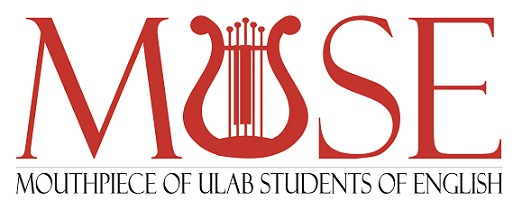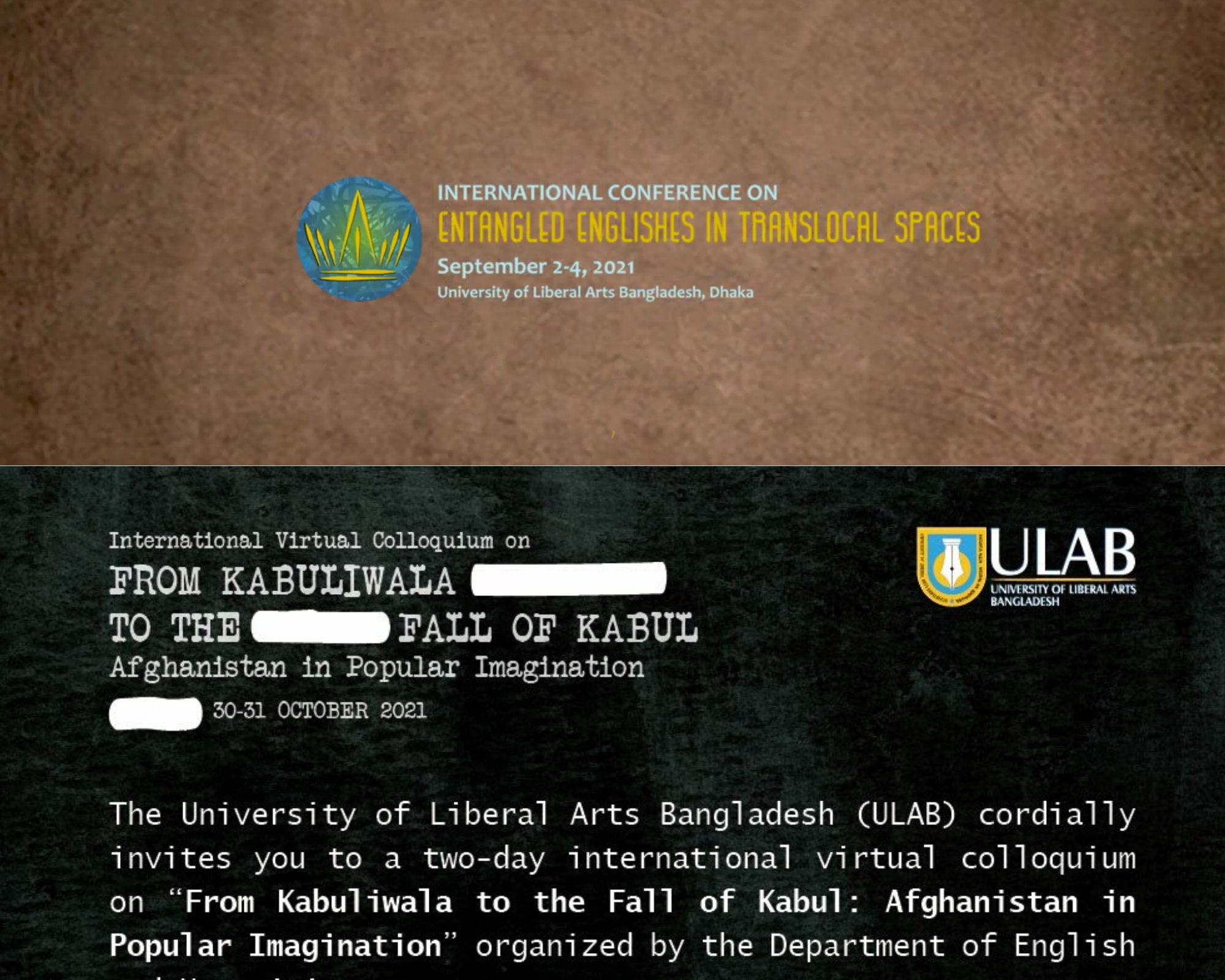Umme Hani Anika
International Conference on “Entangled Englishes in Translocal Spaces”
A stimulating three-day long international conference titled ‘Entangled Englishes in Translocal Spaces’ was organized at the University of Liberal Arts Bangladesh from 2nd to 4th September 2021 by the Center for Language Studies and the Department of English and Humanities. The conference packed with 66 paper presentations, five plenary sessions, three roundtable discussions, one panel discussion welcomed scholars, a poetry session, researchers and professionals from varying disciplines all across the globe and saw them engage in identifying and disputing the hegemonic nature of English in multiple spheres of life. In addition the discussion also explored possible methods of making Englishes a language that will not segregate but unite people, communities and nations and lead to attaining the sustainable development of human resources.
The ceremony was inaugurated by Professor Shamsad Mortuza, the then Acting Vice Chancellor of ULAB and Dean of the School of Arts and Humanities, ULAB. In addition, Kazi Nabil Ahmed, Member of ULAB Board of Trustees and Professor Dr. Kazi Shahidullah, Chairman of University Grants Commission (UGC) attended as special guests. While Education Minister Dipu Moni made her address as the chief guest.
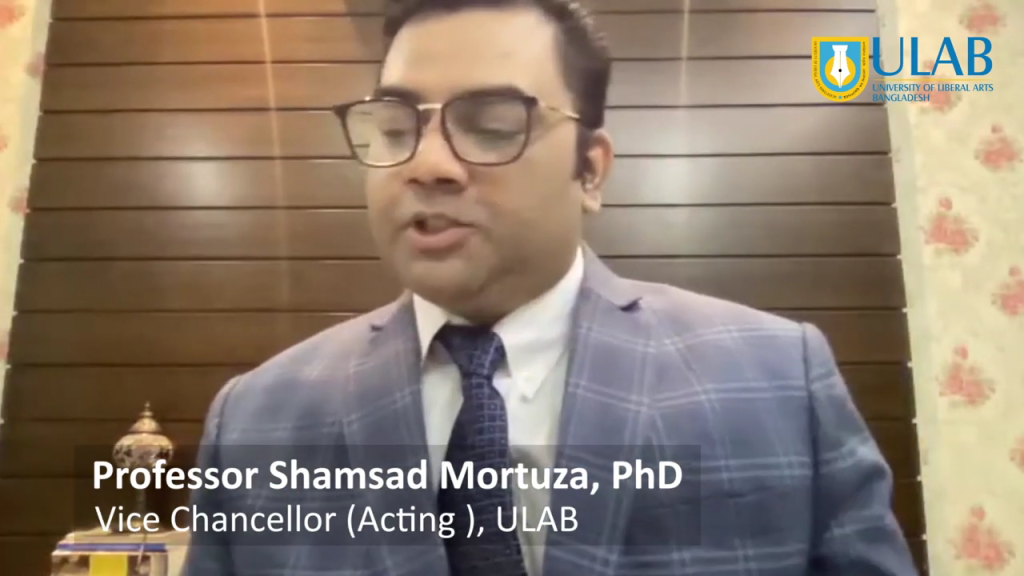
Distinguished sociolinguist, Alaistair Pennycook, professor emeritus of the University of Technology Sydney set the tone for the conference with his keynote address where he pointed out that English is deeply embedded in the social, political, material and cultural relations of our everyday lives. He also emphasized that by exploring the entanglements of English in multiple facets of our lives we can get out of the mindset of the restrictive varieties of English and find out ways in which English can be used to cater to the diversifying economic, educational and cultural needs of a multi-cultural global population.
Throughout the three days 66 papers were presented by scholars of various universities from ten countries including Bangladesh where scholars looked into the various Englishes and their roles in the multitude aspects of society.
The first plenary session addressed by Professor Shamsad Mortuza, the then Acting Vice Chancellor of ULAB and Dean of the School of Arts and Humanities, ULAB focused on the role of English in the impact ranking of higher education and how it fares in its goal of achieving the SDGs. Professor Mortuza pointed out that the impact ranking of the universities has increased the gap between resource rich and resource lacking universities with its prioritization of English as the medium of communication. He questioned whether in doing so, if the impact ranking is moving away from the SDG of empowering marginalized population and reducing the gap. Professor Mortuza concluded his presentation by analyzing the numerous factors that make English a common mode of communication in today’s multi-cultural reality.
The second plenary session that took place on the second day of the conference, saw Dr. Sender Dovchin, Senior Research Fellow at Curtain University, Australia focus on the way “Translingual English” and how new forms of English were created which were used to assume new identities. She elaborated that discourses on “Translingual English” emphasized mostly on the innovative and blended linguistic uses of the youth who are connected across borders through media and technology, and linguistic innovativeness and flexibility in various forms of popular music. Her presentation focused on the youths of Global South particularly Mongolia, Australian Aboriginal Communities. She found that Global South youths are apparently more active producers of popular culture compared to talks which portray them as receivers of global culture. The third plenary session was presided over by Professor Salimullah Khan, Director of Center for Advanced Theory, ULAB, where Professor Khan elaborated on the function and position of English during the early and late colonial periods in Bangladesh. He quoted Marx who added on to Hegel’s quote of “great events and characters occurring twice but first as a tragedy and second as farce.” Using this quote Professor Khan explained the introduction of English in colonial Bengal where he discussed about how Rammohun Roy’s suggestion to imbue European education of Mathematics, Sciences and Philosophy was misrepresented into providing European medium of instruction in 1833. The Professor also discussed how Sanskrit and Arabic were contested and English was glorified. He explained that due to the European medium of instruction and the inferiority complex the colonizers injected into the veins of the colonial Bengal a class of people, the professor called “colonial middle class” emerged. And these people are Indian externally and by blood but have English views, principles and intelligence. These people, as the Professor detailed were given the task to flourish the other dialects with scientific names of western origin and provide an education in this manner. But this method failed to imbue the people with the proper form of education. He also added agreeing to French Psychiatrist Frantz Fanon’s description of the colonial middle class as people whose clock has stopped, who do not encourage any development rather are content with the pre-existing thoughts and views towards life and everything in it.

The Fourth plenary discussion taking place on the third day of the conference welcomed Dr. Shyam Sharma, Associate Professor, State University of New York to give his talk on “Countering the hegemony of English for making knowledge production more valuable in the Global South.” Dr. Sharma proposed his “scholar 2.0” framework where he elaborated that by going beyond satisfying individual interest and ego, using all languages of use to the local society and vocations, involving in translanguaging and global citizenship will be able to detach ourselves from the hegemony of Englishes.
Associate Professor of Grand Valley State University, Dr. AzfarHussain’s, insightful talk on “The language question in Bangladesh:Class, capitalism, and colonialism” was the topic of the fifth plenary session. In his discussion, he utilized a Gramscian-Fanonian analysis to depict the way capitalism, imperialism and colonialism- which serve as components of oppression- and these “overdetermine” how principle and peripheral languages function in present day Bangladesh. He also elaborated the way language is a crucial site of struggle and disputes regarding class, ethnicity, gender and race. He concluded by demonstrating how the language question has still remained tangled in Bangladesh to this day, without rectifying it there is no hope of being liberated which was the main rationale of the Language Movement in 1952.
The first roundtable discussion held on the second day of the conference on the topic “English Studies in the Age of World Englishes and World Literature” had distinguished speakers such as Professor Fakrul Alam, Director of Bangabandhu Sheikh Mujib Research Institute for Peace and Liberty, University of Dhaka, Professor Firdous Azim, BRAC University, Dhaka, Professor Nevin Farida, University of Dhaka, Professor Kaiser Haq, University of Liberal Arts Bangladesh (ULAB), Professor Niaz Zaman, Independent University Bangladesh (IUB). In the discussion the professors recalled how English was taught during their time to how English is being taught now. Professor Kaiser Haq in his discussion particularly, mentioned the type of literary works he would like to be included in the English literature syllabus in the future so that students of English get a holistic knowledge of the literary figures and their works. Professor Niaz Zaman in particular added that during her time as an undergraduate student they were not introduced to any female writers of English. It was only much later that literary works of female writers began to be included in the undergraduate English programs. The talks concluded with some insightful remarks from the moderator and discussant of the session Professor Mashrur Shahid Hossain, Jahangirnagar University, Dhaka.
The second roundtable discussion held on the third day of the conference focused on the topic “Creating Leaders for English language education in Bangladesh and Beyond: Challenges and future directions”. The discussion invited Mr. Colm Downes, Director, English Education and Society, British Council, Indonesia; Dr. Mian Md. Naushaad Kabir, University of Dhaka; Mr. Harunur Khan, BRAC University, Dhaka; Professor Sayeedur Rahman, University of Dhaka and Ms. Raihana Sultana, The American Center, US Embassy Dhaka, Bangladesh. The discussion provided intriguing and mind-blowing insights into the various obstacles that stand in the way of imparting the right kind of knowledge to the next generation and how to best tackle them in an efficient and timely manner. Professor DilAfrozeQuader, University of Dhaka, moderated the session and concluded with her thought-provoking remarks regarding the topic.
The final roundtable discussion had an equally captivating topic titled “Entangled Englishes: Implications for Language-in-Education Policy and Practice”. The prominent speakers of this discussion included Professor Syed Md. Golam Faruk, DG, Directorate of Secondary and Higher Education, Dhaka; Dr. Obaidul Hamid, University of Queensland, Australia; Prof. Syed Manzoorul Islam, University of Liberal Arts Bangladesh (ULAB); Prof. AMM Hamidur Rahman and Daffodil International University (DIU). In the discussion Professor Syed Manzoorul Islam, recounted how the study of English came to being from the colonial times as the language was a tool was used to fulfill the hegemonic objective of the British and how it has been shaped in the recent era. Professor Syed Md. Golam Faruk, applauded the country’s institutions and government’s timely action to switch to the new online platform in order to provide a seamless learning experience for the students and he believed that evaluation in various Bangla Medium schools through the new assignment system has proven effective. To this the Moderator and Discussant of the session Prof. Arifa Rahman, University of Dhaka, added that there needs to be constant research on testing the validity and usability of the evaluation methods and even after doing research the results should be used to effectively improve the evaluation methods keeping in mind the students’ future needs. She also emphasized involving teachers in the making of syllabus, books, and that they should be trained to meet learner needs.
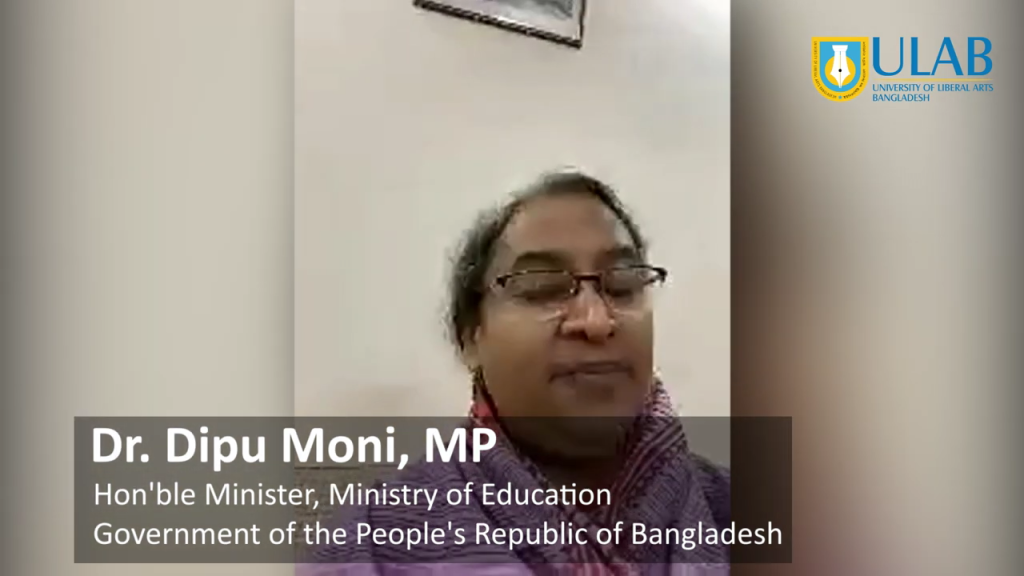
The intriguing panel discussion was held on the third day on the topic titled “The politics of injustice in translingualism: Linguistic racism”. The speakers of the panel were Dr. Toni Dobinson, Curtin University, Australia; Dr. Maggie McAlinden, Edith Cowan University, Australia; Dr. He Zhang, Northwest University, China; Dr. Qian Gong, Curtin University, Australia and Dr. Shaila Sultana, University of Dhaka, Bangladesh. The speakers each looked into different aspects ‘linguistic racism’ from the perspectives of speakers of different geographic locations and uncovered what it meant to speak as a ‘translingualracialized’ subject and investigated the way basic human rights are infringed in education, job sectors, health and social situations.
Dr. Toni Dobinson, focused on the topic, “Investigating translingual practices at an Australian university” where she investigated the university policy documents which support the dominant use of English in formal learning environment, although the university thrives on the students from various linguistic background. Dr. Dobinson interviewed students, academics and put their experiences into context by analyzing the university policy documents, materials for staff development and university’s use of signboards in order to focus on the degree of representation of their “linguistic self” in the university. Her participants revealed their opinions on following the protocol of dominantly using English on campus and simultaneously taking part in liberating practices like translingual inclusion.
Dr. Maggie McAlinden, talked on her topic, “Empathizing as an emancipatory pedagogical tool: Affects, risks, and racisms”, where she elaborates her experience as a participant-researcher, that how English language teachers in Australia unintentionally defuse situations of racism through “positive stereotyping, sympathy, and other affective responses to students” and that doing so causes imbalance in the power relations and extinguishes student agency. She identified that while empathy can reduce racism it also has its perils, while also reassessing empathy as a crucial teaching element to open fragile teaching spaces which may allow teachers to analyze their relations with “anti-racist identity” that inadvertently withstands criticism.
“Translanguaging as theory and practice for participatory intercultural storytelling by Chinese international students in Australia”, was the third topic of the panel which was elaborated by Dr. He Zhang, Northwest University, China and Dr. Qian Gong, Curtin University, Australia. The researchers looked into how “translanguaging” may play a possible role on the intercultural communication for English-as-Additional-Language students from China and other racial background in an Australian university. Their research found out new theoretical and practical insights based on “Chinese international students’ digital intercultural storytelling” that the concept of translanguaging provided.
The final panel speaker, Dr. Shaila Sultana University of Dhaka, Bangladesh, imparted interesting insights on her topic, “Indigenous ethnic minority students in the multilingual ecology of Bangladesh”. In her research, Professor Sultana, looked into the linguistic choices of ethnic minority groups in a Bangladeshi university by drawing reference to the concepts of ‘multilingual ecology’ and ‘structures of feeling in unequal Englishes’. Her presentation pointed out that unequal importance of languages and racism persist at the grassroots level due to the inferiority complex and apprehensiveness felt by the subjects who are ‘linguistically racialized’. She urged that a platform that allows intermingling of languages and various cultural factors and build a critical awareness of subjectivity in order to avoid the balance of language tipping on the most dominant one and losing the diverse indigenous ethnic languages.
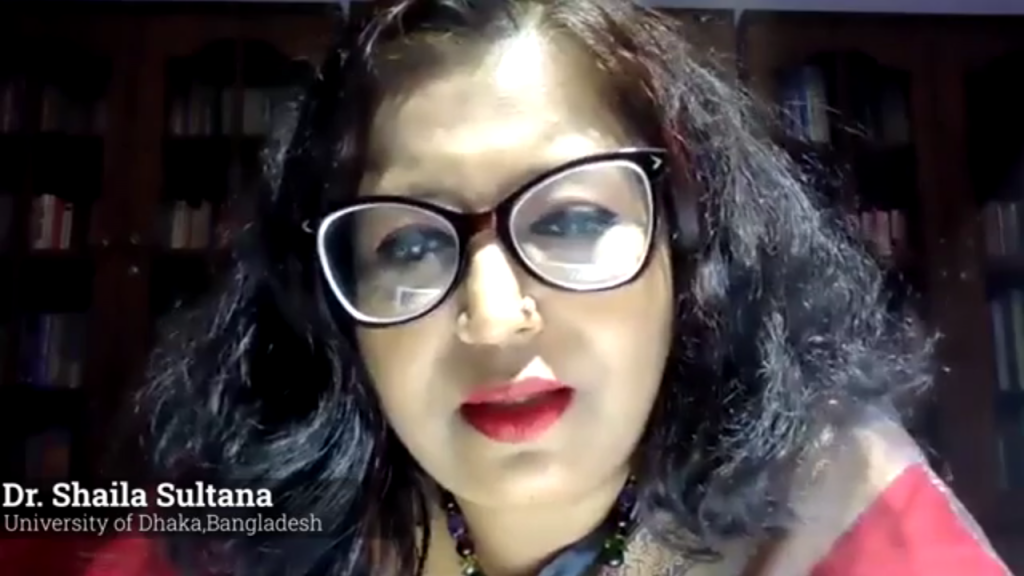
Acting Cultural Affairs Officer of the US Embassy in Dhaka, Sharlina Hussain-Morgan was present during the closing ceremony as the chief guest along with the then the then Special Advisor to the ULAB Board of Trustees, Professor Imran Rahman. ProfessorShaila Sultana, Conference Convener and Advisor, Center for Language Studies, ULAB, provided her vote of thanks. The three-day international conference ended with a cultural show performed by the students of the Department of English and Humanities of the university.
The ULAB Afghan Colloquium 2021: Afghanistan in Critical Conversations
The Department of English and Humanities at the University of Liberal Arts Bangladesh (ULAB) organized an international virtual colloquium on “From Kabuliwala to the Fall of Kabul: Afghanistan in Popular Imagination” on October 30-31, 2021. The first of its kind in the new reality of a fallen Kabul, the academic event was applauded for its timeliness and a nuanced understanding of a political phenomenon with a tremendous popular appeal. The event hosted participants from all over the world—those who responded to the concept note circulated just a month before the event. It was the urgency of the political situation that made the event come into being in the first place, and the participation of delegates from around the world evidenced the need for critical conversations on Afghanistan and its place in popular imagination. In addition, the colloquium also hosted an inter-university creative contest for university students on the theme of “Flight from Kabul” to critically engage them in this discourse. Drawing from creative and critical domains, the event has truly demonstrated what it has put forth as its theme: “critical empathy.”
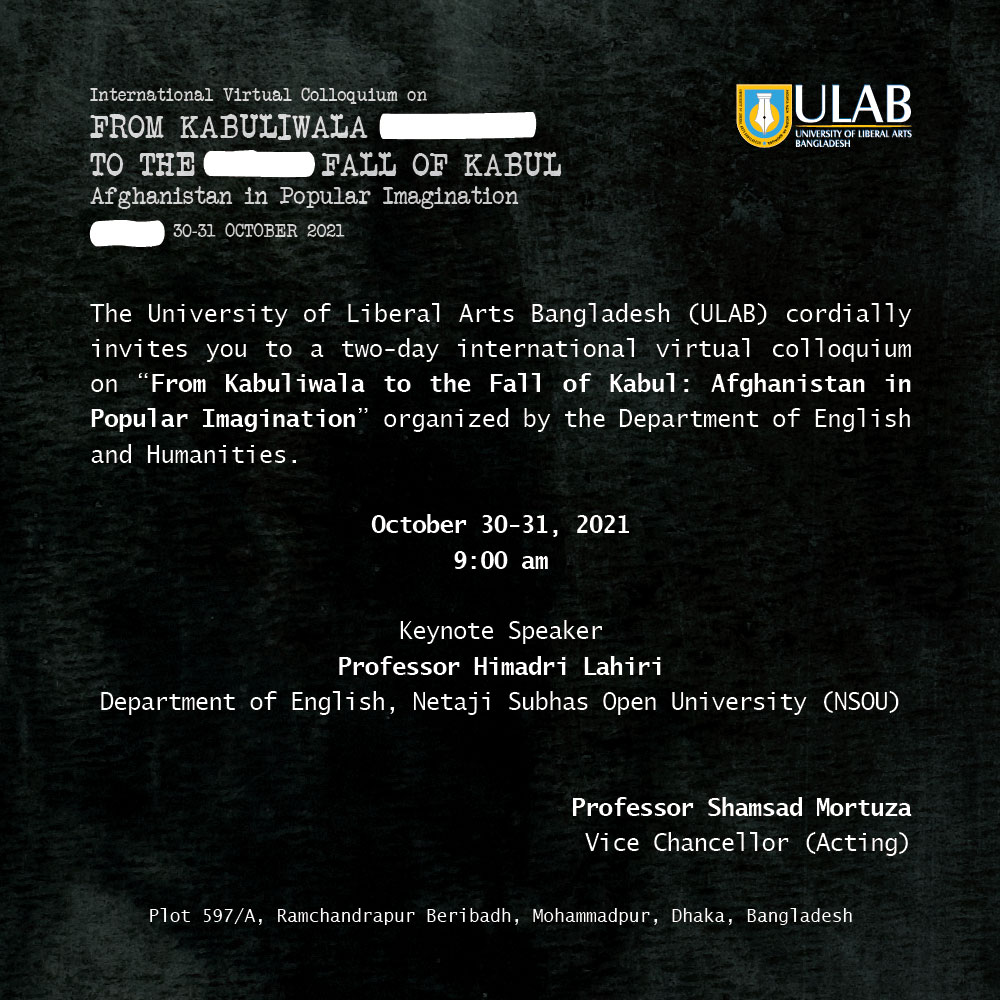
In the inaugural ceremony, which was graced by Professor Imran Rahman, the then Special Advisor to the ULAB Board of Trustees and Professor Shamsad Mortuza, the then Vice Chancellor (Acting), ULAB, hosted three Afghan young women, Samira, Khadija and Mina, from a refugee camp in Wisconsin, USA. “Afghan Letters to the World,” as the segment was named, brought in three Afghan girls writing to the international community about their traumas and tribulations, their dreams and expectations, fears, anxieties, and emotions. Listening to their tragic stories, the audience realized in a way rarely witnessed in academic events the need for responsible dialogues on the popular imagination of Afghanistan. The keynote address by Professor Himadri Lahiri of Netaji Subhas Open University entitled “Images of Afghanistan: Through the Cultural Lens” was a contextualized and nuanced exposition of the image of Afghanistan in popular cultural practices of the world and their major discursive tendencies. Professor Lahiri set the tone for the conversations taking place over two days of academic sessions and anticipated the defining character of the event, its accommodation of narratives in critical dialogues.
The two plenary addresses by Professor Claire Chambers (“Some Thoughts on Afghanistan”) and Professor Lily Want (“Writing the Self in Afghanistan: Foregrounding Western and Islamic Feministic Perspectives”) offered fresh perspectives on Afghan literary cultures, social practices, and broader theoretical views, especially those related to gender, broadening the range of issues generally associated with the theme of the colloquium. A roundtable and a panel discussion explored topics of contemporary relevance: “Contested Histories, Continuous Memories: Your History Gets in the Way of My Memory,” and “Afghanistan Today: Heritage, Arts and Women.” In the roundtable, moderated by Professor Sabiha Huq, the discussants, Professor Niaz Zaman and Professor Himadri Lahiri, asserted the existence of inconsistent historical narratives in South Asia and explored the theme of the colloquium critically. In the panel discussion, moderated by Dr. Khan Touseef Osman, Representative of South Asia Foundation to UNESCO, France Marquet, renowned artist Kubra Khademi, and human rights activist Khushi Kabir represented South Asia Foundation in the colloquium. Discussions ranged from heritage preservation in Afghanistan, the future of arts and artists to women’s rights.
Celebrating the great Bengali author Syed Mujtaba Ali and his works set in Afghanistan — autobiographical and otherwise, renowned author and intellectual Professor Syed Manzoorul Islam was in conversation with Dr. Sohana Manzoor in the session titled “Past Continuous: Afghanistan in Deshe Bideshe and Now.” Professor Islam contextualized Ali’s works in the political history of Afghanistan and commented on what appeal these works may have for us in the present. Professor Azfar Hussain recited Afghan women’s poetry in the session “‘Load Poems Like Guns?’: Afghan Women’s Poetry against Bullets, Bayonets, and Bombs” where he also provided a critical commentary on how Afghan women raise their voices against different forms of oppression—by the Taliban as well as US imperialists—through poetry.
Entries in the Creative Contest were shortlisted and blindly judged by Dr. Fahmida Akhter and Dr. Sohana Manzoor. Professor Razia Sultana Khan graced the special showcasing of the shortlisted entries as the Special Guest. University students from all over Bangladesh had submitted a total of 92 pieces of creative writing (short story, poetry), artwork, and performances. The winners of the contest were Sheikh Muhammad Mustafa of ULAB (First Prize), Abidul Islam Omit of Jagannath University (Second Prize), and Alif Al Rahman of Eastern University (Third Prize). The Special Guests and judges commented on the variety of subjects and media used by the young and talented Bangladeshi students.
The Colloquium concluded with the closing ceremony graced by Professor Imran Rahman, the then Special Advisor to the ULAB Board of Trustees. A vote of thanks was delivered by the convener of the colloquium to mark the close of the proceedings.
